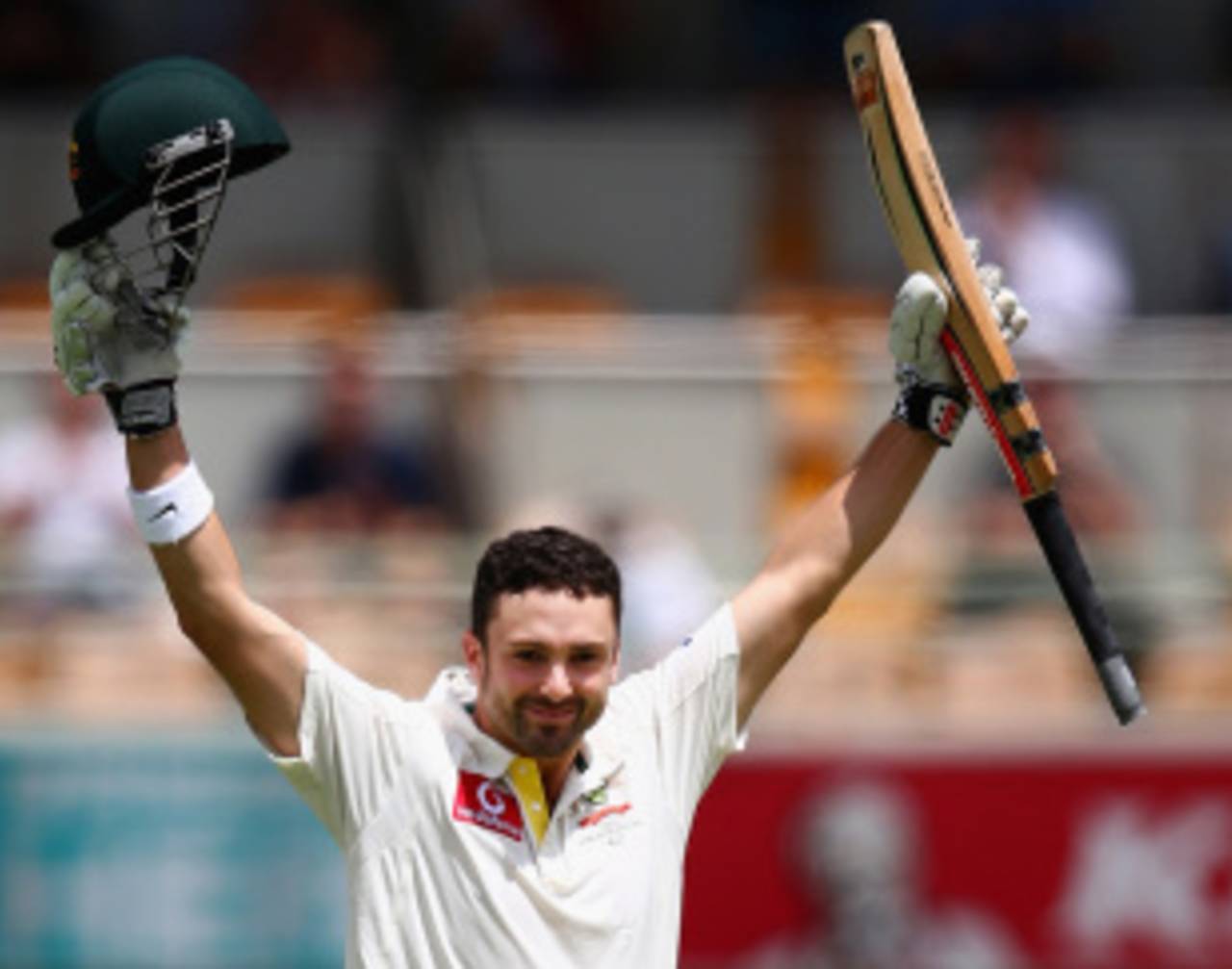The hundred Ed had to have
Cowan's century at the Gabba was a celebration of bloody-minded determination over hope
Mark Nicholas
Nov 14, 2012, 3:49 PM

Cowan: thought, application and desperate desire • Getty Images
More than anyone, the first Test match, at the Gabba, belonged to Ed Cowan. More even than to Michael Clarke, whose exceptional innings was worth nearly double the one by his opening batsman. Cowan's performance was a celebration of the power of the mind; of sheer bloody-minded determination over hope. It was proof that if you want something badly enough, you are in with a chance. Think Gary Kirsten and the early days of Alastair Cook, and now think Ed Cowan. Left-handers all, without the Lara genius or the Gower grace but with a common call - thou shalt not pass. The appeal of cricket comes as much from the artisan as from the artist. Thus Cowan rewards the viewer as, say, Hashim Amla might do, but without the raw material. You will not bask in Cowan's strokeplay, but you will rise to his achievement.
Test cricket is about need, not want. We all want things, material or otherwise. Most of us want to be appreciated, for example, but don't necessarily push the boat out to ensure that we are. Golfers want birdies, tennis players points, footballers goals, but just how far will they go in pursuit of their currency? Desperation for success is a fascination. For a time, it appeared there was something almost ethereal about the way in which Roger Federer was able to glide in and out of points, never compromised. In contrast Rafael Nadal, Novak Djokovic and Andy Murray were torn apart by the outrage of fortune or otherwise. To Federer a point was a symphony, to his rivals it was heavy metal. In the days they could not catch him, they appeared about to burst. There are few sights so riveting as the implosion of the desperate sportsman. And it is that same desperation that has led them to catch him now, so, at last, the spoils are shared.
Recorders used to say that the reason West Indian cricketers reached such heights in the 1980s were the options. Like Brazilian soccer players who might otherwise have been lain to rest in the favelas that were once their home, sport was a way out. But Cowan was a Cranbrook boy, a Sydney school so elite that James Packer is among its alumni. No need of a way out for him. Private education softens such a man, does it not? Hardly. Cowan is teak. Ask Steyn and Morkel.
Ed Cowan did not just want this hundred, he absolutely had to have it. There was no other way. A hundred or bust and Ed Cowan is too smart to bust
Australian cricketers do not leave New South Wales without good reason. Adam Gilchrist went west because he could not get a regular game. Good reason. Cowan feared the same as the selectors' affection turned to Phillip Hughes and Usman Khawaja (there is irony in the fact that both these batsmen have recently moved to new states themselves, without compelling reason). Cowan chose somewhere that needed him, which meant Tasmania. It is a mainly cold place by Australian standards, and without Sydney's lights. But it is the place where David Boon and Ricky Ponting made the runs of their youth. That was good enough for Cowan.
You only have to read his columns on these pages to know how much thought and application will have gone into this Gabba debut hundred. Perhaps it was a plot, set for November 9th 2012. There was then a brilliance in the delay of its execution. Almost a day and a half in the field and another in the dressing room, dreaming the dreams of glory and fulfilment, while the rain and the South African batsmen threatened to derail the plot.
Mid-afternoon, Monday, 12th November. 12/11/12, Ed's day. A year on from the passing of Peter Roebuck, an early mentor. South Africa with 450 on the board, not part of the plot. Dale Steyn at the end of his run. Ed fidgets, settles. Steyn sprints and delivers. Fast, accurate, and Ed, bat idiosyncratically held aloft, leaves safely alone. The plot is underway. Steyn, at the completion of his follow-through, stares. Likes what he sees. The ball swung back a little and carried at pace through to the wicketkeeper. He turns back for his mark. Ed fidgets, settles. Steyn sprints and delivers a fine ball, straight as an arrow and full in length.
Cowan plays the forward-defensive shot of his life. Perfect, flawless. Big stride, full face so that Steyn could read the bat maker's name. The ball rolled back, de-armed. Get past that buddy boy. Plot operational. For the next six hours and 16 minutes - 257 balls in all - there was no flourish, just blocks and nudges and pulls and cuts and the occasional check drive. In such denial there is satisfaction.
Three years in the making, since the day the Cowan clan upped sticks from safe old Sydney and went to the land of the Tasmanian devil. Hour upon hour of net practice, analysis, soul-searching, and puke-making training, all because this cricketer simply must make runs for Australia. Without them he is unfulfilled. The need is so great that sacrifice is a given. Ed Cowan did not just want this hundred, he absolutely had to have it. There was no other way. A hundred or bust and Ed Cowan is too smart to bust.
Mark Nicholas, the former Hampshire captain, presents the cricket on Channel 9 in Australia and Channel 5 in the UK